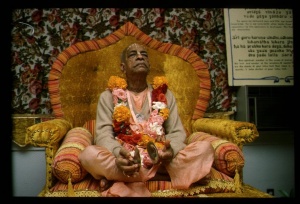SB 5.24.8: Difference between revisions
No edit summary |
(Vanibot #0054 edit - transform synonyms into clickable links, which search similar occurrences) |
||
| Line 25: | Line 25: | ||
<div class="synonyms"> | <div class="synonyms"> | ||
''eteṣu'' | ''[//vanipedia.org/wiki/Special:VaniSearch?s=eteṣu&tab=syno_o&ds=1 eteṣu]'' — in these; ''[//vanipedia.org/wiki/Special:VaniSearch?s=hi&tab=syno_o&ds=1 hi]'' — certainly; ''[//vanipedia.org/wiki/Special:VaniSearch?s=bila&tab=syno_o&ds=1 bila]-[//vanipedia.org/wiki/Special:VaniSearch?s=svargeṣu&tab=syno_o&ds=1 svargeṣu]'' — known as the heavenly subterranean worlds; ''[//vanipedia.org/wiki/Special:VaniSearch?s=svargāt&tab=syno_o&ds=1 svargāt]'' — than the heavenly planets; ''[//vanipedia.org/wiki/Special:VaniSearch?s=api&tab=syno_o&ds=1 api]'' — even; ''[//vanipedia.org/wiki/Special:VaniSearch?s=adhika&tab=syno_o&ds=1 adhika]'' — a greater quantity; ''[//vanipedia.org/wiki/Special:VaniSearch?s=kāma&tab=syno_o&ds=1 kāma]-[//vanipedia.org/wiki/Special:VaniSearch?s=bhoga&tab=syno_o&ds=1 bhoga]'' — enjoyment of sense gratification; ''[//vanipedia.org/wiki/Special:VaniSearch?s=aiśvarya&tab=syno_o&ds=1 aiśvarya]-[//vanipedia.org/wiki/Special:VaniSearch?s=ānanda&tab=syno_o&ds=1 ānanda]'' — bliss due to opulence; ''[//vanipedia.org/wiki/Special:VaniSearch?s=bhūti&tab=syno_o&ds=1 bhūti]'' — influence; ''[//vanipedia.org/wiki/Special:VaniSearch?s=vibhūtibhiḥ&tab=syno_o&ds=1 vibhūtibhiḥ]'' — by those things and wealth; ''[//vanipedia.org/wiki/Special:VaniSearch?s=su&tab=syno_o&ds=1 su]-[//vanipedia.org/wiki/Special:VaniSearch?s=samṛddha&tab=syno_o&ds=1 samṛddha]'' — improved; ''[//vanipedia.org/wiki/Special:VaniSearch?s=bhavana&tab=syno_o&ds=1 bhavana]'' — houses; ''[//vanipedia.org/wiki/Special:VaniSearch?s=udyāna&tab=syno_o&ds=1 udyāna]'' — gardens; ''[//vanipedia.org/wiki/Special:VaniSearch?s=ākrīḍa&tab=syno_o&ds=1 ākrīḍa]-[//vanipedia.org/wiki/Special:VaniSearch?s=vihāreṣu&tab=syno_o&ds=1 vihāreṣu]'' — in places for different types of sense gratification; ''[//vanipedia.org/wiki/Special:VaniSearch?s=daitya&tab=syno_o&ds=1 daitya]'' — the demons; ''[//vanipedia.org/wiki/Special:VaniSearch?s=dānava&tab=syno_o&ds=1 dānava]'' — ghosts; ''[//vanipedia.org/wiki/Special:VaniSearch?s=kādraveyāḥ&tab=syno_o&ds=1 kādraveyāḥ]'' — snakes; ''[//vanipedia.org/wiki/Special:VaniSearch?s=nitya&tab=syno_o&ds=1 nitya]'' — who are always; ''[//vanipedia.org/wiki/Special:VaniSearch?s=pramudita&tab=syno_o&ds=1 pramudita]'' — overjoyed; ''[//vanipedia.org/wiki/Special:VaniSearch?s=anurakta&tab=syno_o&ds=1 anurakta]'' — because of attachment; ''[//vanipedia.org/wiki/Special:VaniSearch?s=kalatra&tab=syno_o&ds=1 kalatra]'' — to wife; ''[//vanipedia.org/wiki/Special:VaniSearch?s=apatya&tab=syno_o&ds=1 apatya]'' — children; ''[//vanipedia.org/wiki/Special:VaniSearch?s=bandhu&tab=syno_o&ds=1 bandhu]'' — family relations; ''[//vanipedia.org/wiki/Special:VaniSearch?s=suhṛt&tab=syno_o&ds=1 suhṛt]'' — friends; ''[//vanipedia.org/wiki/Special:VaniSearch?s=anucarāḥ&tab=syno_o&ds=1 anucarāḥ]'' — followers; ''[//vanipedia.org/wiki/Special:VaniSearch?s=gṛha&tab=syno_o&ds=1 gṛha]-[//vanipedia.org/wiki/Special:VaniSearch?s=patayaḥ&tab=syno_o&ds=1 patayaḥ]'' — the heads of the households; ''[//vanipedia.org/wiki/Special:VaniSearch?s=īśvarāt&tab=syno_o&ds=1 īśvarāt]'' — than those more capable, like the demigods; ''[//vanipedia.org/wiki/Special:VaniSearch?s=api&tab=syno_o&ds=1 api]'' — even; ''[//vanipedia.org/wiki/Special:VaniSearch?s=apratihata&tab=syno_o&ds=1 apratihata]-[//vanipedia.org/wiki/Special:VaniSearch?s=kāmāḥ&tab=syno_o&ds=1 kāmāḥ]'' — whose fulfillment of lusty desires is unimpeded; ''[//vanipedia.org/wiki/Special:VaniSearch?s=māyā&tab=syno_o&ds=1 māyā]'' — illusory; ''[//vanipedia.org/wiki/Special:VaniSearch?s=vinodāḥ&tab=syno_o&ds=1 vinodāḥ]'' — who feel happiness; ''[//vanipedia.org/wiki/Special:VaniSearch?s=nivasanti&tab=syno_o&ds=1 nivasanti]'' — live. | ||
</div> | </div> | ||
Latest revision as of 22:16, 18 February 2024

A.C. Bhaktivedanta Swami Prabhupada
TEXT 8
- eteṣu hi bila-svargeṣu svargād apy
- adhika-kāma-bhogaiśvaryānanda-bhūti-vibhūtibhiḥ
- susamṛddha-bhavanodyānākrīḍa-vihāreṣu
- daitya-dānava-kādraveyā nitya-pramuditānurakta-
- kalatrāpatya-bandhu-suhṛd-anucarā gṛha-pataya
- īśvarād apy apratihata-kāmā māyā-vinodā nivasanti
SYNONYMS
eteṣu — in these; hi — certainly; bila-svargeṣu — known as the heavenly subterranean worlds; svargāt — than the heavenly planets; api — even; adhika — a greater quantity; kāma-bhoga — enjoyment of sense gratification; aiśvarya-ānanda — bliss due to opulence; bhūti — influence; vibhūtibhiḥ — by those things and wealth; su-samṛddha — improved; bhavana — houses; udyāna — gardens; ākrīḍa-vihāreṣu — in places for different types of sense gratification; daitya — the demons; dānava — ghosts; kādraveyāḥ — snakes; nitya — who are always; pramudita — overjoyed; anurakta — because of attachment; kalatra — to wife; apatya — children; bandhu — family relations; suhṛt — friends; anucarāḥ — followers; gṛha-patayaḥ — the heads of the households; īśvarāt — than those more capable, like the demigods; api — even; apratihata-kāmāḥ — whose fulfillment of lusty desires is unimpeded; māyā — illusory; vinodāḥ — who feel happiness; nivasanti — live.
TRANSLATION
In these seven planetary systems, which are also known as the subterranean heavens [bila-svarga], there are very beautiful houses, gardens and places of sense enjoyment, which are even more opulent than those in the higher planets because the demons have a very high standard of sensual pleasure, wealth and influence. Most of the residents of these planets, who are known as Daityas, Dānavas and Nāgas, live as householders. Their wives, children, friends and society are all fully engaged in illusory, material happiness. The sense enjoyment of the demigods is sometimes disturbed, but the residents of these planets enjoy life without disturbances. Thus they are understood to be very attached to illusory happiness.
PURPORT
According to the statements of Prahlāda Mahārāja, material enjoyment is māyā-sukha, illusory enjoyment. A Vaiṣṇava is full of anxieties for the deliverance of all living entities from such false enjoyment. Prahlāda Mahārāja says, māyā-sukhāya bharam udvahato vimūḍhān: (SB 7.9.43) these fools (vimūḍhas) are engaged in material happiness, which is surely temporary. Whether in the heavenly planets, the lower planets or the earthly planets, people are engrossed in temporary, material happiness, forgetting that in due course of time they have to change their bodies according to the material laws and suffer the repetition of birth, death, old age and disease. Not caring what will happen in the next birth, gross materialists are simply busy enjoying during the present short span of life. A Vaiṣṇava is always anxious to give all such bewildered materialists the real happiness of spiritual bliss.